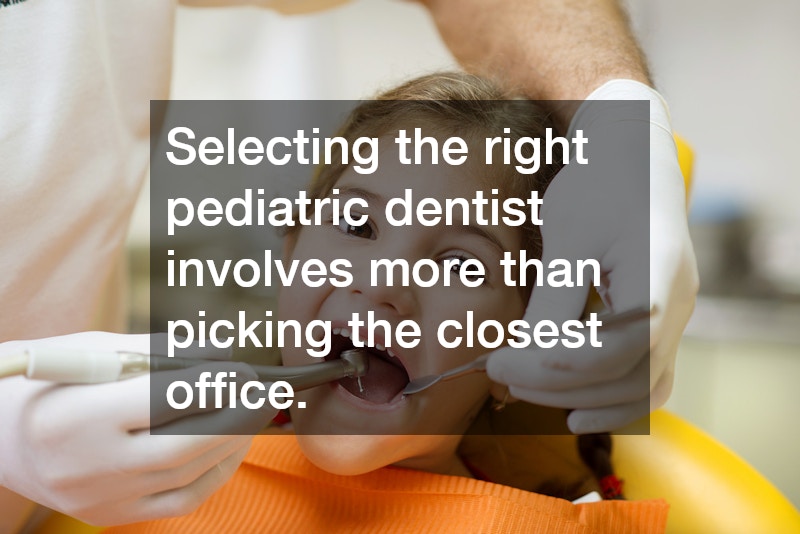Choosing a pediatric dentist for your child is a decision that goes beyond convenience—it’s about setting the foundation for a lifetime of oral health. A positive early dental experience can make children more comfortable with dental care, encourage healthy habits, and prevent issues later in life. But with so many options, how do you choose the right one? This guide will walk you through the essential qualifications, office environment, reputation, accessibility, and insurance considerations to help you make an informed choice.
What Qualifications Should a Pediatric Dentist Have?
Understand Their Educational Background
A pediatric dentist isn’t just a general dentist who works with kids. After completing dental school, they undergo an additional two to three years of specialized training focused on child development, behavior management, and the unique dental needs of infants, children, and adolescents. This ensures they are equipped to handle everything from baby teeth to early orthodontic concerns.
Check for Licensing and Certification
Every practicing dentist must hold a state license, but pediatric dentists may also pursue board certification from the American Board of Pediatric Dentistry (ABPD). Certification demonstrates not only that the dentist has completed the required training but also that they are committed to maintaining the highest standards of care.
Evaluate Additional Specialized Credentials
Beyond core qualifications, look for dentists who are members of professional organizations such as the American Academy of Pediatric Dentistry (AAPD) or local dental associations. These affiliations signal dedication to ongoing education and staying current with the latest techniques in pediatric care.
How Can You Assess the Dentist’s Office Environment?
Observe the Child-Friendly Office Design
The right pediatric dentist’s office should put children at ease from the moment they walk in. Bright colors, playful décor, and kid-friendly waiting areas with books or toys can help reduce anxiety. A welcoming environment makes visits more enjoyable and less intimidating for young patients.
Evaluate the Staff’s Interaction with Children
Watch how the staff greets and interacts with children. Do they use friendly, reassuring language? Are they patient and understanding when children are nervous? A staff that is trained in child communication can transform a stressful visit into a positive experience.
Consider the Availability of Modern Equipment
Technology matters, too. Offices that use digital X-rays, gentle cleaning tools, and minimally invasive treatment methods can make procedures safer and more comfortable for children. Modern equipment also allows for more accurate diagnoses and effective care.
What Should You Look for in the Dentist’s Experience and Reputation?
Research the Dentist’s Experience in Pediatric Care
Experience makes a difference, especially when it comes to children with special healthcare needs or dental anxieties. Ask how long the dentist has been practicing pediatric dentistry and whether they have experience with cases similar to your child’s.
Read Reviews and Recommendations
Word of mouth is a powerful tool. Talk to friends, family, or your child’s pediatrician for recommendations. Online reviews can also give insight into other parents’ experiences, highlighting both strengths and potential concerns.
Check Professional Affiliations
Affiliations with respected dental organizations, hospitals, or teaching institutions add credibility. These connections often reflect a dentist’s dedication to professional development and excellence in pediatric care.
How Important is the Location and Accessibility of the Dentist Office?
Assess Travel Time and Distance
Convenience matters, especially with young children. Choose an office that is close to home, daycare, or school. This reduces stress on appointment days and makes it easier to schedule regular checkups.
Review Office Hours and Availability
Look into whether the dentist offers flexible hours, such as evenings or weekends. Also, ask about emergency availability. Dental emergencies can happen unexpectedly, and knowing your dentist is accessible provides peace of mind.
Consider Accessibility Features
Make sure the office is easy to navigate for all patients. Check for ample parking, stroller-friendly entrances, and accommodations for children with disabilities. These details reflect the practice’s commitment to inclusivity and patient comfort.
What Role Does Insurance Play in Selecting a Pediatric Dentist?
Verify Insurance Compatibility
Before scheduling, confirm that the dentist accepts your insurance plan. In-network providers can significantly reduce out-of-pocket costs and simplify billing.
Understand Payment Options
Even with insurance, certain treatments may not be fully covered. Ask about flexible payment plans, financing, or discount programs for uninsured services. Clear payment policies help you budget effectively for your child’s care.
Consider Cost vs. Care Quality
While cost is an important factor, it should not be the only consideration. A lower-priced option may not always provide the same level of care, experience, or child-friendly environment. Balancing affordability with quality ensures your child receives the best possible dental experience.
Selecting the right pediatric dentist involves more than picking the closest office. By carefully evaluating qualifications, office environment, experience, accessibility, and insurance compatibility, you can find a provider who meets both your child’s dental needs and your family’s practical concerns. The right choice will set your child up for positive dental visits and a healthy smile that lasts a lifetime.




